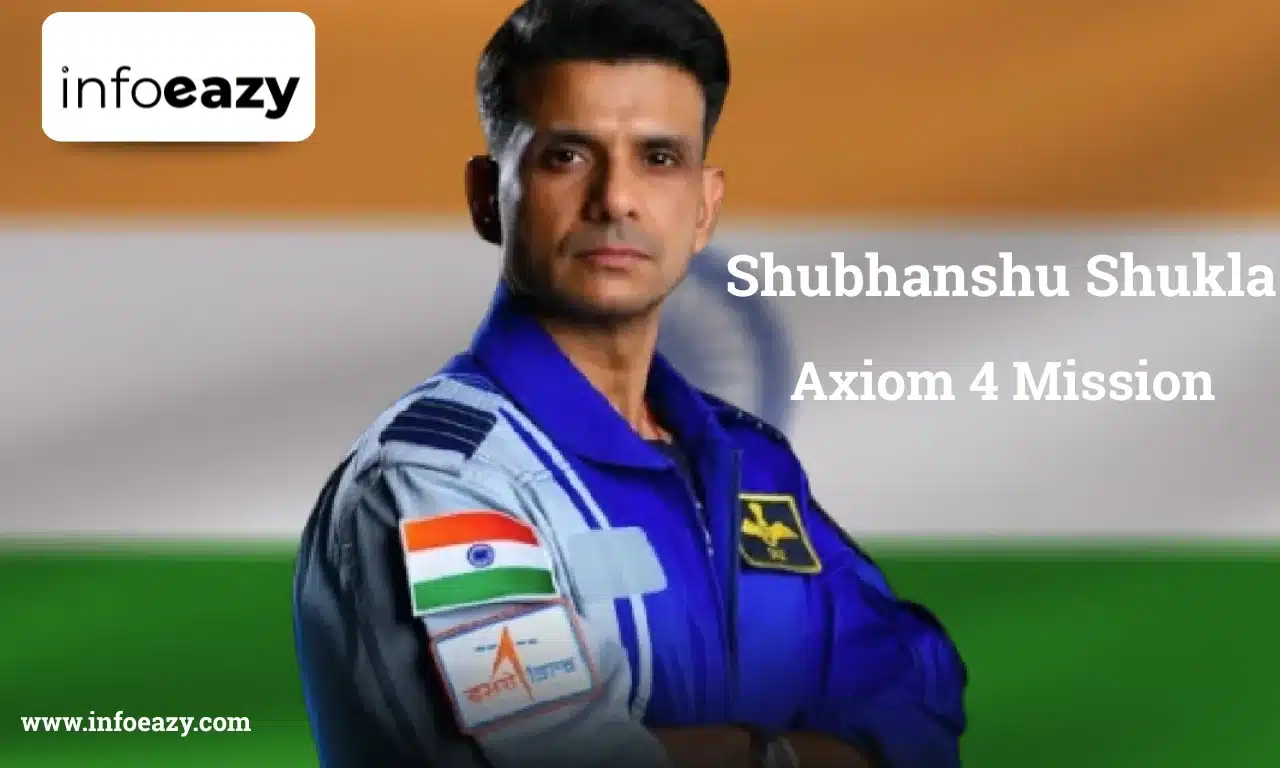The Shubhanshu Shukla Axiom 4 Mission is more than just a spaceflight, as it marks a transformational step for India in the new space economy. On June 25, 2025, Group Captain Shubhanshu Shukla became the first Indian in 41 years to venture into space, representing India on an international platform as part of Axiom Space’s fourth private astronaut mission to the International Space Station (ISS). With scientific innovation, global cooperation, and national pride at its core, this mission rewrites the narrative of Indian human spaceflight.
Shubhanshu Shukla Returns on Earth
Shubhanshu Shukla has returned to Earth after spending 18 incredible days in space, marking a significant milestone in his journey as an explorer. During his time aboard the spacecraft, he conducted crucial experiments, observed the cosmos, and adapted to life in zero gravity. His mission not only contributed to scientific advancement but also showcased immense mental and physical endurance. His safe return is a proud moment, symbolizing human potential beyond boundaries.
What is Axiom 4 Mission (Ax-4)?
Axiom 4 Mission is the fourth commercial spaceflight organized by Axiom Space in partnership with NASA and SpaceX. The launch took place aboard a SpaceX Falcon 9 rocket from Kennedy Space Center’s Launch Complex 39A, Florida. Aboard the Crew Dragon spacecraft, the team comprised four astronauts: Group Captain Shubhanshu Shukla (India), Peggy Whitson (USA), Sławosz Uznański (Poland), and Tibor Kapu (Hungary).
This mission is part of a broader NASA initiative to develop a sustainable economy in low Earth orbit (LEO), where private players play a key role in human spaceflight and scientific research. Ax-4 is being hailed as the most scientifically rich mission by Axiom so far, featuring over 60 microgravity experiments, including seven contributed by Indian research institutions.
Who is Shubhanshu Shukla?
Group Captain Shubhanshu Shukla, born in Lucknow, is a highly decorated Indian Air Force (IAF) pilot and one of the first astronauts trained under ISRO’s Gaganyaan programme. With over 2,000 flying hours and experience in operating top-tier aircraft such as the Sukhoi Su-30MKI, MiG-29, and Jaguar, Shukla was selected for astronaut training in 2019.
His international training at Russia’s Gagarin Cosmonaut Training Center and NASA’s Johnson Space Center equipped him with extensive operational knowledge, emergency preparedness, and scientific research capabilities essential for long-duration missions in microgravity. As the pilot of Ax-4, Shukla played a central role in navigation, communication, and experiment execution aboard the ISS.
Why the Mission Matters for India?
The Shubhanshu Shukla Axiom 4 Mission is a significant step for India, marking its return to human spaceflight after four decades. It highlights the country’s growing role in global space exploration, supports future missions like Gaganyaan, and showcases India’s scientific capabilities on an international stage.
Reviving Indian Human Spaceflight After 41 Years
Since Rakesh Sharma’s historic journey in 1984 aboard a Soviet spacecraft, no Indian had ventured into space. Shukla’s participation in Ax-4 is a monumental event that reignites India’s presence in human spaceflight and symbolizes the country’s evolving role in global space exploration.
Gaganyaan Mission Readiness
ISRO is preparing for its own crewed mission, Gaganyaan, by 2026. The Ax-4 mission provides real-world operational insights that are crucial for mission planning, astronaut training, and hardware development. Lessons learned from Shukla’s space experience will feed directly into Gaganyaan’s safety protocols, life-support systems, and scientific planning.
Strengthening International Collaborations
This mission has strengthened India’s global partnerships with space agencies like NASA and ESA. The joint training, technology sharing, and mutual research participation reflect India’s strategic move towards space diplomacy and cross-border scientific innovation.
Promoting STEM in India
Shukla’s mission has already ignited curiosity and ambition among Indian students. Through live educational interactions from space and nationwide outreach programs, the mission is fostering the next generation of scientists, engineers, and astronauts in India.
Experiments Conducted by Shubanshu Shukla in Space
The Ax-4 mission stands out for its science-driven objectives. Among the 60+ experiments, seven were selected and funded by Indian academic institutions and private researchers. These include:
- Microgreen Cultivation (Methi and Moong Dal)
Assessing seed germination, growth, and gene behavior in space. The goal is to identify suitable food crops for long-term missions and future space colonization.
- Edible Microalgae Study
Evaluating the behavior of three strains of microalgae in microgravity to determine their nutritional viability and environmental sustainability in space environments.
- Cyanobacteria Research
Understanding how cyanobacteria photosynthesize and reproduce in microgravity. These organisms are candidates for oxygen generation and waste recycling aboard space stations.
- Tardigrade Resilience Experiment
Studying tardigrades (water bears), known for their ability to survive extreme environments. This research may unlock genetic tools for radiation resistance and cellular repair.
- Muscle Regeneration Study
Testing metabolic supplements and bio-agents to counter muscle atrophy in microgravity, a challenge faced by astronauts during long missions.
- Cognitive and Interface Behavior
Analyzing astronaut interaction with digital screens and interfaces in space to understand visual stress, cognitive load, and screen usability in zero gravity.
- Agricultural Sustainability Models
Investigating the nutritional and genetic consistency of crops grown in space, which is critical for future lunar or Mars bases.
Axiom 4 Mission Timeline
The Axiom 4 Mission followed a carefully planned schedule from launch to return, marking several key milestones in space exploration. This timeline highlights the major events of the mission, including launch, docking with the ISS, duration of the stay, and the return journey to Earth.
| Axiom 4 Mission Timeline | |
| Date | Event |
| June 25, 2025 | Launch of Ax-4 from Kennedy Space Center |
| June 26, 2025 | Docking with the International Space Station |
| June 26–July 10 | Two-week stay aboard ISS for scientific tasks |
| July 10–16, 2025 | Return journey and Earth reentry procedures |
From Rakesh Sharma to Shubhanshu Shukla: Bridging Generations of Indian Spaceflight
In 1984, Rakesh Sharma made history as the first Indian to travel to space, capturing the imagination of an entire nation with his iconic response, “Saare Jahan Se Achha.” Four decades later, Group Captain Shubhanshu Shukla has reignited that legacy by becoming the next Indian to reach space, this time as part of a globally coordinated commercial mission aboard Axiom-4. While Sharma’s journey was rooted in India’s early collaboration with the Soviet Union, Shukla’s mission symbolizes India’s entry into the modern space era, driven by scientific innovation, global partnerships, and commercial spaceflight. Together, their stories mark the evolution of India’s human spaceflight journey from inspiration to active participation on the global stage.
Also Read: Iran-Israel Ceasefire
Shubhanshu Shukla’s Words That Inspired a Nation
Before liftoff, Shubhanshu Shukla spoke emotionally about carrying the aspirations of 1.4 billion Indians. In his message, he said, “My mission is for every Indian child who dreams of touching the stars.” He dedicated the launch to his mother, wife, and the nation, words that deeply resonated with audiences across India and beyond.
India’s Space Economy: A Future Beyond Gaganyaan
India’s space sector is growing rapidly with policy reforms, increased private participation, and international cooperation. Shukla’s mission aligns with the nation’s vision to:
- Launch an indigenous Indian Space Station by 2035
- Increase India’s share in the global space economy
- Support startups in satellite tech, launch services, and space R&D
- Train the next generation of scientists through public-private partnerships
The success of Ax-4 gives confidence to private and public stakeholders that India can be a key player not just in launching satellites, but in deep-space exploration and commercial human spaceflight.
Shubhanshu Shukla Axiom 4 Mission FAQs
Q1. What is the aim of Axiom Mission 4?+
Q2. Why is Shubhanshu Shukla going to space?+
Q3. Who is selected for the Axiom 4 mission?+
Q4. Who are the members of Axiom-4?+
Q5. Where will Shubhanshu Shukla travel?+
Tags: axiom 4 mission rakesh sharma Shubhanshu Shukla Shubhanshu Shukla Axiom 4 Mission




